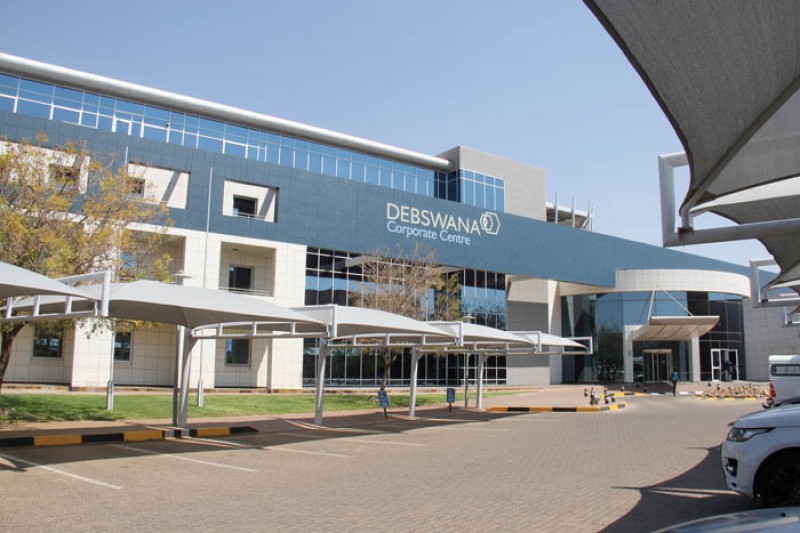Debswana's P110m suit opens can of worms
Oarabile Mosikare | Friday July 10, 2020 17:06


In the latest case, Gaborone High Court will hear how management at the world’s leading diamond miner procured spy equipment without authority from the Directorate of Intelligence and Security (DIS) to spy on employees. A local company Infotrac (Proprietary) Limited owned by one Mompoloki Motshidi claims P100 million and costs of suit against Debswana for breach of contract. Infotrac also seeks 10% interest per month, from date of breach of contract to date of full and final payment.
In court documents filed on June 10, 2020, Infotrac through its attorneys says the cause of action is recovery of a debt based on breach of a verbal consultancy agreement by the defendant. “On or about the January 6, 2018 at Gaborone, the defendant, duly represented by its then managing director, the late Mr Albert Milton, one Mr Mazwigula, one Mr Kewakae and one Mr Keitumetse entered into an oral agreement in terms whereof the plaintiff agreed to provide consultancy services to the defendant,” the attorneys stated. Attorney Tsholofelo Mvungama also said that the final date of delivery of the consultancy services by the plaintiff shall be on or before end of November 2018.
Following the conclusion of the consultancy agreement between the parties, the plaintiff duly discharged its obligations. In addition, Infotrac delivered the services on time that is before the due date. The defendant failed, refused and neglected to discharge its obligation by failing to make full payment or any part thereof for services rendered to it in respect of the parties’ oral consultancy agreement and thus in breach of the parties’ agreement.
“The defendant further engaged a third party to facilitate discussions pertaining to settlement of the initial claim. This was not disputed by the defendant. The plaintiff on numerous occasions demanded that the defendant remedy the breach, but the defendant failed to do so, despite its numerous undertakings to pay,” Mvungama said.
As a result of the breach by the defendant, the attorney continued, Infotrac is entitled to recover all the monies due, owing and payable to it for services rendered.
As a result, Infotrac suffered contractual damages and is consequently entitled to recover the amount of its claim against the defendant. Debswana was given 14 days to respond to the claims. The matter is before Justice Abednego Tafa.
In one of the letters to Motshidi, the managing director of Infotrac, Debswana’s attorney John Carr-Hartley on May 19, 2020, wrote that they noted from his letter under reply that he will not agree to Debswana’s request for time to review information nor will he provide any further documentary evidence or information.
“For the sake of clarity, Debswana denies liability to Infotrac, whether in the respects alleged or the amount claimed, or at all,” Carr-Hartley said.
He added that Debswana has clearly established and defined the Supply Chain Management process that governs all their client’s procurement of goods and services.
“There is nothing to demonstrate that a contract or agreement of any description for the provisions for the alleged services was ever entered into.”
Finally, since Motshidi threatened to seek intervention of various parties if Debswana did not settle the matter by May 22, 2020, Debswana’s attorney recorded that “there are ongoing investigations into the allegations made which are at an extremely sensitive stage and any information released to any third party whomsoever could seriously jeopardise the investigations and Debswana’s efforts at getting to the truth.”
He therefore said they trust that Motshidi will allow for investigations to be undertaken and concluded without the process being in jeopardy.
In response to Debswana’s attorneys, on May 25, 2020 Motshidi advised that this was not the first engagement that Infotrac had with the giant mining company. “The client facilitated the procurement of services and the modus operandi has been consistent with previous engagements, which were procured, delivered and paid for by your client without any contention as is this case with [the] matter at hand,” Motshidi advised.
He added: “To cite an example of such other highly confidential procurement as referred to above, was the procurement of high-tech ‘spy’ equipment, further details of which shall be addressed at a later stage should need arise”.
He explained that this procurement of the spy equipment by Debswana was consistent with the procurement of services under contention and hence to be the client’s “normal and preferred process of procurement for such service”.
“Furthermore, we were also required by your client to ensure that the DIS does not come to know of the procurement and supply of the spy equipment because that may have raised questions of breach of national security given that Debswana does not have authority to procure and use such equipment.
Needless to say, that we delivered the equipment, your client demanded that Infotrac must use wrong narration and/or description, issued our invoice and were duly paid. The purpose of this narration was to avoid the workers union finding out about Debswana’s strategy of spying on their employees.”
To this end, Motshidi submitted that Debswana has been consistent in the choice of procurement methodology when procuring goods and services from Infotrac and this has been accepted as the preferred procurement practice bearing in mind the nature of services requested.
He also disclosed that Debswana engaged one George Tlhalerwa to discuss payment terms for the services rendered.
“These discussions with Mr Tlhalerwa are on record and all evidence surrounding such negotiation/discussions is in our possession. It would be interesting to know why your client would have engaged the services of Mr Tlhalerwa to broker negotiations around the payment amount including the ‘special purpose vehicles’ to facilitate the payment.”
